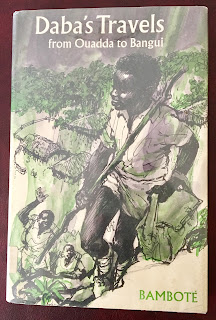READ
As was the case with the book I chose last week for Cape
Verde, there are very few books from the Central African Republic that have
been translated into English. The book that I and other bloggers who are reading
the world have found for this country is Daba’s Travels from Ouadda to Bangui, by Pierre Makombo Bamboté.
This book is geared more to children than adults, maybe in
the eight to twelve-year-old range, and tells the story of Daba’s idyllic life
growing up in the Central African Republic. According to the book’s dedication,
it’s based on the author’s own childhood. It begins in the village of Ouadda,
where Daba lives a happy life with his parents. His father supports the family
by gathering rubber, honey, and beeswax, and by growing cotton.
The action soon moves to the town of Bambari, about 125
miles away, where Daba is sent to attend boarding school. He does well in
school, spends time in other villages during school breaks, and acquires a
pen-pal from Marseilles named Guy. When Guy wins a trip to Africa in a contest,
he, Daba, and a few other of Daba’s fellow students spend a summer teaching people
in a nearby village how to read and write. As the summer ends and Guy returns
to Marseilles, Daba and his friends find out they’ve been awarded scholarships
to attend school in France.
The book has no plot to speak of – it’s just an account of
Daba’s childhood. Published in 1970, those happy-go-lucky days are likely a
thing of the past for anyone currently living in the Central African Republic, which
has endured many years of civil war in the recent past. It has been called the
worst country in the world for young people, and it is also the unhealthiest
country, according to researchers at the University of Seattle.
Considering the dire condition in which the Central African
Republic currently exists, Daba’s Travels from Ouadda to Bangui serves as a sad reminder of the country’s good old days. The
author is fortunate to have grown up there when he did.
COOK
Many of the meals Bamboté wrote about in Daba’s Travels from Ouadda to Bangui were
heavily meat-based, and hunting was a favorite pastime in the villages Daba
visited. Food crops and fruit trees were mentioned too, however – manioc, corn,
papayas, mangos, guavas, oranges, groundnuts (peanuts), and bananas. In fact,
when Daba goes away to boarding school, he often skips the school meals and “lived
mostly off the fruit he had gathered from the guava and papaya trees where he
did his homework.”
Of all the vegan or veganizable recipes I found online for the
Central African Republic, the one that appealed to me the most was the one for
this sweet peanut butter rice dish that I found on the Global Table Adventure
website. Apparently, peanut butter is a staple of Central African Republic
cuisine. This dish could not have been any more simple to make, and it was really good. I had it for breakfast, and it was a great way to start the day!
GIVE
There were no projects listed for the Central African
Republic on the GlobalGiving website, so I had to do a little digging to find
an organization for my donation to this country. I discovered Water for Good,
which is working to bring clean water to the people of the Central African
Republic through the drilling, servicing, and rehabilitating of wells. This
organization works with local water businesses in order to ensure that the wells
will be sustainable in the long-term. More information about Water for Good is
available at https://waterforgood.org/.
After I’d made my donation, I came across a very recent article on UNICEF’s
website about the vast numbers of people from the Central African Republic who
are currently fleeing the violence caused by armed groups that control much of
the country. According to the article, “These past
months and weeks have seen horrendous reports on children’s rights violations.
Precise numbers are impossible to know but we know for a fact that children
have been killed; there have been incidents of sexual violence, and that
recruitment into armed groups is happening. But there are less direct
violations with lasting consequences – having to flee or take refuge in the
bush; having no education or health care.” For that reason, I decided to also make
a donation to UNICEF to help the children of this troubled country.
NEXT STOP: CHAD



No comments:
Post a Comment